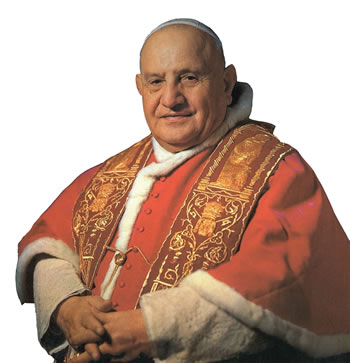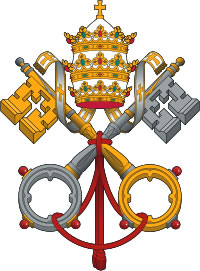‘Fun’-damentally – Pope John XXIII
 With the 50th anniversary of his death approaching, it is time to recall this wonderfully human Pope who launched the renewal of Vatican II.
With the 50th anniversary of his death approaching, it is time to recall this wonderfully human Pope who launched the renewal of Vatican II.
“We must blow off the dust from the throne of Constantine which has been lying too long on the Chair of Peter.”
Pope John XXIII.
He was born Angelo Giuseppe Roncalli on the 25th of November 1881 though we came to know and love him as Pope John XXIII. His progressive approach to Catholicism and Christian unity together with his genuine love for humanity are all well documented, and endeared him to people of all denominations throughout the world. But among his special attributes, were his tremendous humour and complete sense of the ordinary, which in turn led to the breaking down of centuries-old barriers from almost day one of his brief term.
 Solitary dining - expected of the pope - was one of the first things to go. “I have read the Gospel over carefully,” said John “without finding a single passage which prescribes that one should eat alone. We know that Jesus loved to eat in company.” He liked nothing better than to debate the issues of the world with others so soon dispensed with the rule that a subject couldn’t be discussed without the pope first introducing it.
Solitary dining - expected of the pope - was one of the first things to go. “I have read the Gospel over carefully,” said John “without finding a single passage which prescribes that one should eat alone. We know that Jesus loved to eat in company.” He liked nothing better than to debate the issues of the world with others so soon dispensed with the rule that a subject couldn’t be discussed without the pope first introducing it.
Many years of mixing with people made it impossible for this genial man to lead an isolated lifestyle. The Vatican became a hive of activity as he sought everyone out from secretaries to gardeners, explored nooks and crannies inside and around the grounds and when he’d finished on home turf, he went out onto the streets of Rome. The pontiff’s wanderings didn’t go without criticism, which caused him to comment: “So they say I go out too much during the day. Very well, from now on I’ll go out at night.”
John’s ability to identify with the ordinary person played a huge part in his popularity. Several times during his early papal days he would wake in the night, going over and over a problem in his mind. “I’ll talk it over with the Pope,” he’d say thinking he was still a cardinal. Then it would dawn on him: “But I am the Pope! Very well, I’ll talk it over with God.” Likewise on the night prior to declaring the convocation of Vatican Council II: “Giovanni, why don’t you sleep? Is it the Pope or the Holy Spirit who governs the Church? It’s the Holy Spirit is it not? Well then, go to sleep Giovanni!”
And talking he did in abundance. John was the first to admit this. “In order to be a good diplomat,” he said, “there are only two possible solutions: either one must be as mute as a mole, or as garrulous to the point where one’s proposals lose all significance. Given the fact that I’m an Italian, I prefer the second method.” This talkative gift served him well whenever he sensed someone was going to ask for something he was unable to give. His non-stop one-way conversation often left the visitor breathless - it certainly stopped them making their intended request!
No one, it seems, who came into contact with John XXIII escaped his wit. The mother superior of the Holy Spirit Hospital in Rome welcomed him one day with the words, “Most Holy Father, I am the superior of the Holy Spirit.” “Well, I must say you’re lucky, I’m only the Vicar of Jesus Christ!” was the response. When asked by a newcomer to the Holy See the number of persons working at the Vatican, the pontiff mischievously replied, “Oh no more than half of them.”
And who else but John could, after seeing among his audience, the chaplain general under whom he was Fr Roncalli during the First World War, stand to full attention and say, “Sergeant Roncalli, at your orders General!!
Children he especially loved, perhaps because it brought out the child in him. On one of his hospital visits he asked a little boy what he wanted to be when he grew up. The boy answered he thought he’d be either a policeman or a pope. “I would go in for the police if I were you,” said the Holy Father. “Anyone can become a pope, look at me!”
All that we now know of the goodness of this man was common knowledge among many people in and out of Vatican circles long before he took the papal office. As Mgr Roncalli he played dinner host once a month to an Italian welder, his wife and seven children; as observer to UNESCO in 1952 he would often be found dining in the less-than- extravagant UNESCO canteen. Nor as Nuncio to France would he allow any tradesman to leave the Parisian nunciature without sharing a glass of wine with him.
Once, on receiving an extremely slim visitor, Mgr Roncalli, staring at him wistfully, said “We will both have to say a prayer to God, beseeching him to remove half the excess fat I have and give it to you.” More than once he joked about his size. The Nuncio was extolling the beauties of the French Academy, reflecting sadly though that ‘the seats are large enough only for a demi-nuncio.’
The same Nuncio obviously couldn’t resist a little word play with the rather under-clad lady with whom he was seated at a function. At dessert, he offered her an apple which he insisted she take, saying “Please take it Madame. It was only after Eve ate the apple that she became aware of how little she had on!”
How well many of us can relate to his comments prior to learning he was to be transferred to Venice and fearing he would be appointed to the Roman Curia: “Believe me, it’s no fun to go back and work so near to the boss!”
As Patriarch of Venice, he was a familiar figure around the cafes of St Mark’s Square, mixing and mingling with the patrons or just sitting pensively over a glass of wine. He was already seventy-two years of age when he took up the position - one he adopted with relish - and was convinced this was his last posting. Five years later he left to become Pope John XXIII.
When asked how he felt about being elected Pope, his answer was typically John: “Much emotion and a host of anxieties. But also the same sensation as a baby in swaddling clothes, because the cassock which they had slipped over me was very tight and I felt as though I were wrapped up like a mummy.”
He tried hard to follow papal protocol; he was often advised to remember his position when discussing affairs and to use appropriate speech. Though John started off with the best of intentions, his down-to-earth nature usually overrode correctness and the conversation soon became relaxed.
But the pontiff could be serious when he felt the situation dictated and occasionally when it was least expected. He intensely disliked the applause in St Peter’s after he’d spoken, so arranged for the Credo to be said immediately he finished talking. He insisted that Vatican Officials stop bowing and kneeling before him when he received them; he had little time for the adulation that surrounded his status.
Almost 50 years after his death in June 1963, Pope John XXIII still lives through the changes we see around us in our Church, particularly in the progress we’ve made towards Christian Unity, something he felt passionate about. Just days before he died he spoke of it: “In my nightly conversations with the Lord, I always have before me Jesus Crucified, His arms outstretched to receive everyone, because the task of the Catholic and Roman Church is to work for the realisation of the prayer of the Divine Master: that all may be one.”
When he said, “We must employ all means for overcoming the old attitudes, pre-conceived ideas, and the expressions that are non too courteous”, he was referring to the Jewish faith but he might well have been talking about a multitude of creeds. If it’s at all possible to sum the man up, that statement would do it, as it pretty much said all he stood for.
During a pilgrimage to Assisi, someone’s observance paints an even stronger picture: “In my mind’s eye I still see him breaking away from the resplendent cortege of beribboned officials with his hurried steps and lumbering gait. Almost stripped of adornment, he mounted the steps of the altar alone. He looked so poor and frail to me when he blessed the feverish throng. Seldom have I understood as at this moment what it means to be a man face to face with God.”
 Entries(RSS)
Entries(RSS)